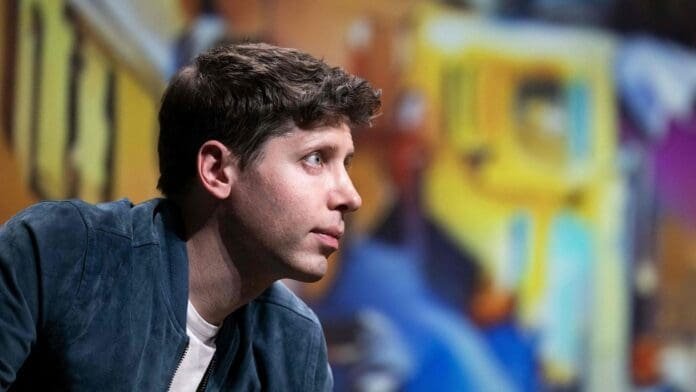Sam Altman thinks alike as Silicon Valley glimpses technology is anticipating us. The AI revolution had created numerous unicorn start-ups valued at $1 billion even before they went public. It is an anticipation that it might now give rise to a completely new category of start-ups: one-person unicorns.
Sam Altman, CEO of OpenAI, thinks that this concept is a blessing. In an interview with Reddit cofounder Alexis Ohanian, Altman revealed that he frequently makes predictions about the moment at which the first creator will become valued at $1 billion without ever employing a single person.
Ohanian was informed by Altman, in my informal group chat with his tech CEO buddies, that there’s this betting pool for the first year that there is a one-person billion-dollar company. It would have never happened in the absence of revolutionary AI technologies, according to Sam. He said that this is beyond the imagination of an ordinary person.
Ohanian was delighted about the prospect as well. He informed Altman that it is a phenomenal concept. They discussed their view during their interview at a conference in September.
A one-person unicorn would challenge the accepted belief that an organization can only expand by hiring more staff members. CEOs and founders will be eager to start working with smaller, more effective, and more culturally diverse teams as soon as possible, according to Ohanian, who predicted a new phenomenon.
/cdn.vox-cdn.com/uploads/chorus_image/image/63704460/sam_altman.0.1546423352.0.png)
For many people, the question is not whether it will happen. Rather, they want to know when it will happen. James Currier, who is a partner in venture capital firm NFX, says that there must be some individuals who disagree with this.
This innovative concept comes at a moment when digital unicorns have to face reality. Numerous “unicorpses” have failed, leaving founders, staff, and investors in the dark. While investors take a bath, former start-up employees find themselves without a job.
In light of this, the idea of a one-person unicorn would be the ideal of the spirit of entrepreneurship that the IT sector values most. A one-person operation that used technology to develop a billion-dollar firm would be the height of the founder myth that Silicon Valley was founded—or at least the perception that it was. The tech industry has always idealized the idea of visionary founders who forced great leaps of technology upon society through sheer willpower.
This idea dates back to the 1930s, when Stanford friends David Packard and Bill Hewlett built their first product in the storied HP garage, giving garages a folkloric class. It also includes the infamous rivalry between Steve Jobs and Bill Gates at the beginning of the personal computing era, as well as individuals like Mark Zuckerberg of Facebook and Sergey Brin of Google, who calculated the algorithms that ruled the internet age.
This approach makes sense in terms of AI enabling a one-person unicorn, and the idea is gaining pull in Silicon Valley. Managing director of Javelin Venture Partners Alex Gurevich states that we are about to join a new ‘golden age’ of start-ups.”
Technology we are looking for
AI has the potential to automate considerable tasks that formerly required additional personnel. Which would only strengthen the creativity that start-ups are known for. According to Gurevich, A start-up has an inherent advantage over an incumbent in that it can move faster, experiment faster, make data-driven conclusions, and test through a wide range of various hypotheses on its way to product market fit.
“GenAI amplifies these natural advantages.”
According to Currier, the proper founder is all that is needed for the tools that are already in our hands. The technology is currently waiting for us. Therefore, we need to learn how to use technology instead of waiting for it to get better.
Numerous AI start-ups have already emerged, specializing in developing solutions for particular commercial tasks like marketing, law, and coding. According to Gurevich, all of this would enable a business to test thousands of alternative product concepts, mottoes, and pricing scenarios in a far shorter amount of time and workforce. Currier likened an AI-powered start-up to a plate-spinning trick, in which the performer only needs to spin the plates once and occasionally push them to keep them balanced on their fingers. He said it in a blog post published in July under the title “The 3-Person Unicorn Start-up.”
The CEO of a one-person unicorn would probably be a salesperson, according to Dan Sutera, cofounder and chief product officer of the website design start-up Muse. It is one aspect of running a business that still requires a human touch. He does, however, issue a warning that some “one-person unicorns” might obtain that status by engaging non-employee contractors to handle design and coding tasks that the AI is incapable of performing. Sutera gives his remarks by saying that I would place an asterisk next to someone who achieved the one-person unicorn threshold record in this manner, even if it is still quite outstanding. Someone who truly operates as a one-person operation will cross the line. That person deserves the reward.
Founders may decide not to allow AI to perform a task just because it is capable of doing it. Researchers on confidence in AI systems at NYU Vasant Dhar say that most entrepreneurs won’t give AI the most important jobs where there could be a very large chance of error. Dhar provides an example of evaluating a lengthy legal document, like a transaction sheet from an investor or a contract with a significant client. A miscalculation in those high-stakes situations might mean start-up death. He describes his concern: “Will artificial intelligence be low-risk and more efficient?”
AI Software Swallows the World
There are only a few start-ups with historically achieved enormous valuations. Incredibly, Instagram had just 13 workers when it sold for $1 billion to Facebook in 2012. Plenty of Fish, which is a dating website, was founded by Markus Frind. It employed just one person in 2008, but it made $10 million in earnings, which was unusual and unreal for fast-growing firms. Even Frind, the quintessential bootstrapper, had roughly 75 workers by the time he sold Plenty of Fish to Match Group, the dominant player in online dating, in 2015 for $575 million.
These businesses have one thing in common besides having few employees. The thing is that they are consumer software companies. According to Gurevich and Currier, the first one-person unicorns are probably start-ups producing those kinds of goods. Like Currier’s plate-spinning analogy, a software product can be designed once, perhaps with the assistance of an AI copilot, and then updated regularly. The majority of the labor that remains when it is finished is finding new users.
According to Currier, Conventional businesses need more luxury. Particularly the ones that produce tangible items. Ford Motor Company operates eight distinct buildings for each of its eight business divisions, including marketing, sales, production, dealerships, and procurement.
You don’t with these [software] interests. You do away with a large number of those business divisions, so you are left with an empty workforce. Then artificial intelligence (AI) steps in to assist you with everything you need to perform.
Even though they are similar, enterprise software products would need to be handled more manually, which would make them less suitable for the automation required to become a unicorn run by one person. According to Gurevich, the businesses buying the software would have higher expectations for cybersecurity and regular customer support.
A direct-to-consumer e-commerce firm is another great candidate to become the first unicorn run by one person, according to Gurevich. According to him, a firm like this would leverage AI for market research, advertising, and concept generation.
Ironically, an AI corporation run by one person is unlikely to exist. According to Gurevich, this one-person unicorn won’t necessarily be developing a native GenAI product, but they will be experts at using GenAI internally to boost the start-up advantage.
Creators Must Have to Predictors
These innovative companies will still require exceptional founders, even if the achievements that were once thought impossible now appear to be feasible or at least conceivable. The majority of unicorns do. According to Currier, the founder of the three-person unicorn will keep the same inspiring ideas that drive the most successful founders.
According to his blog article, The three-person unicorn founders will have to be inclined to epiphanies and fearless in acting on these inclinations. You must have the aggression, boldness, or disagreeableness to take action, as well as the ability to perceive things that others cannot.
A “words person” and a “numbers person” will make up the other two members. They must also possess extraordinary talent. According to Currier, To pull off a three-person unicorn, each of the three will need to possess extremely rare talent. Very few teams will have the variety of skills required to pull it out.”
Sutera, a former vice president of products at unicorn Yext, claims that engineering, sales, and design are a start-up’s three essential components. The “holy trinity” of cofounders with expertise in each respective subject was the norm in the past. However, according to Sutera, a single founder might suddenly maintain all three abilities together, “augmented by AI superpowers.”
Soft talents are one thing that will always be in high demand. According to Sutera, an AI program cannot select the ideal product design or complete a deal with a large client.
Currier concurs. According to Currier, Hard skills become less and less defensible over time for the information work that we are interested in.
Currier claims that a three-person unicorn with AI-powered productivity is a more viable option than a one-person one for another important reason. He says that it’s just inhumane. People require companionship. He added that it will eventually make you alone if you start doing everything by yourself. Being humans, we always need a companion to wind up with in so many aspects. It also helps us to make better decisions. Moreover, we enjoy our work as a team.






